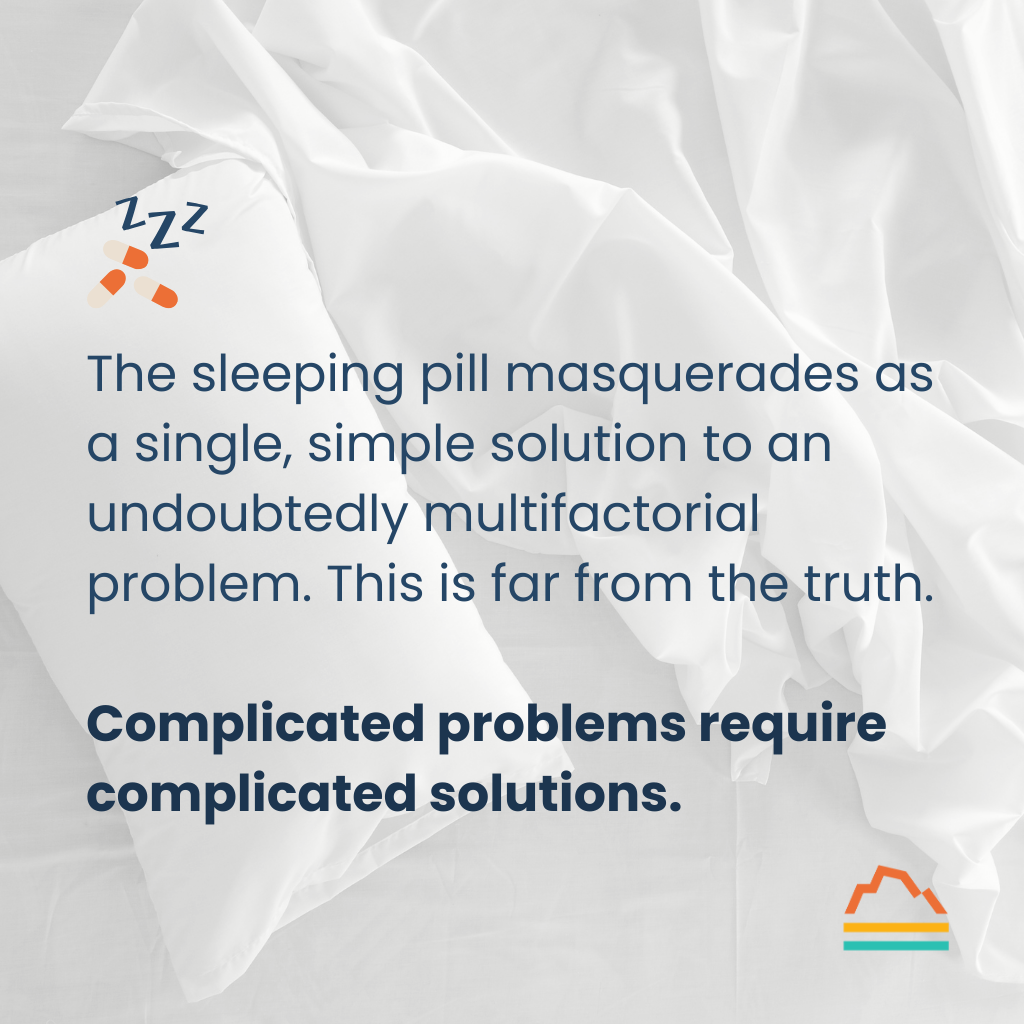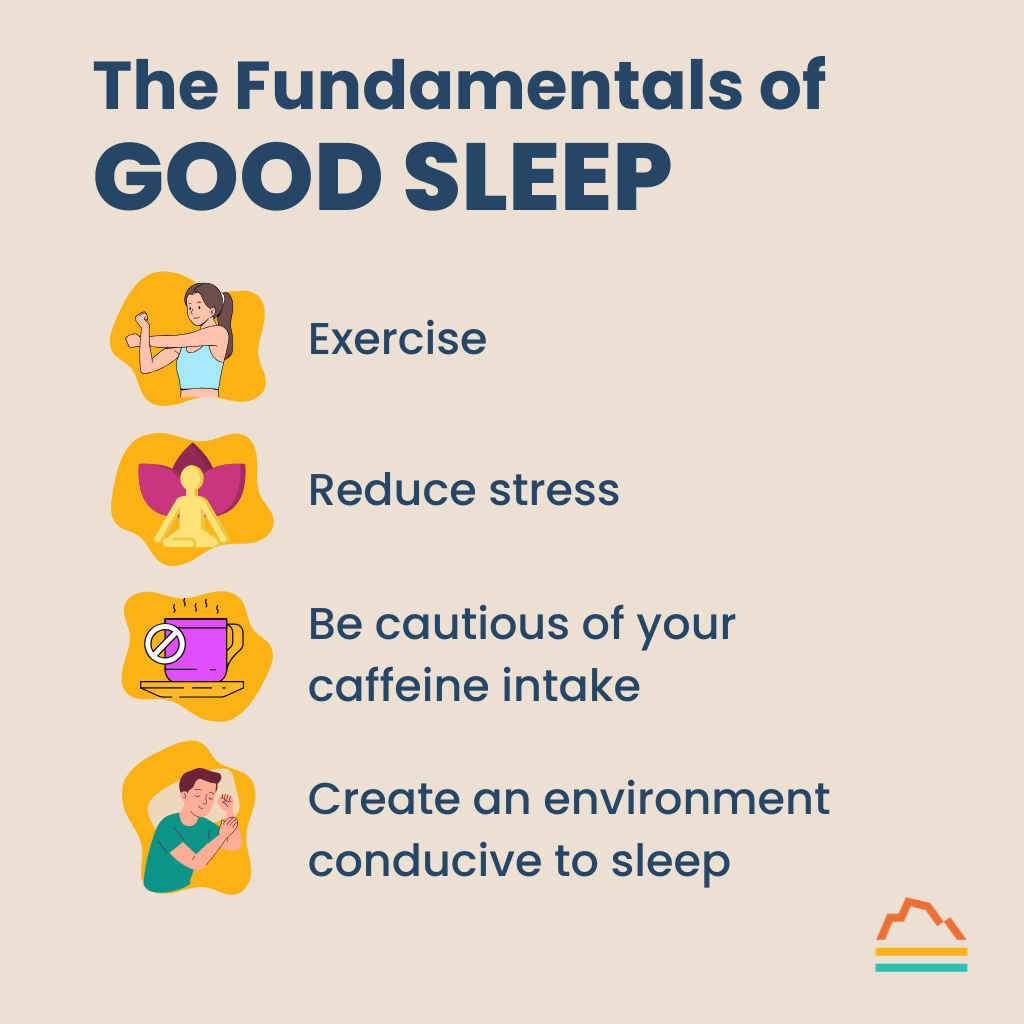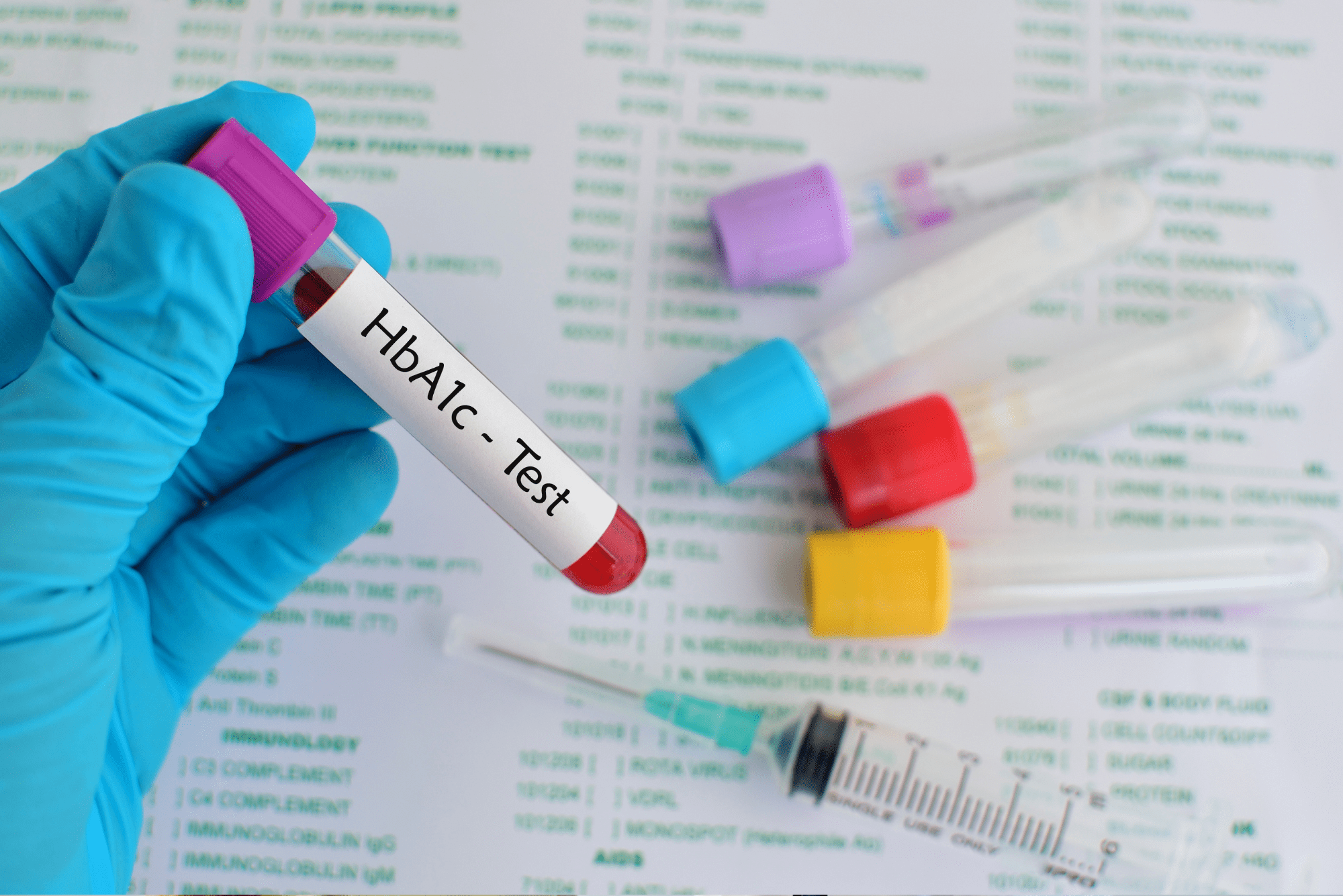How do we fall asleep? Do we actively go out and get sleep, or do we create a set of conditions where we allow sleep to come to us?
This may seem like a hypothetical or philosophical distinction, but it’s vital to understanding sleep management.
The advent of the sleeping pill has led to the misconception that sleep is something you can actively obtain, or “go get.” Unfortunately, that’s a false promise.
The Sleeping Pill: A Dangerous Path
The sleeping pill has led us down a detrimental path for two main reasons.
First, sleeping pills are dangerous. There’s robust evidence that sleeping pills are associated with an increased risk of falls, pneumonia, motor vehicle accidents, cognitive impairment, and premature death. At the societal level, they’ve created a very high burden of side effects.
Sleeping pills are also often taken for chronic daily use for years on end, which is off-label (meaning it’s neither how they were studied nor what the FDA approved them for). The sleeping pills’ safety and efficacy have only been demonstrated in trials of several months’ duration (more on this in a bit). Even then, the absolute magnitude of sleep provided was minimal at best.
Secondly, sleeping pill culture has created a false understanding of how we fall asleep. The healthiest and most efficient route to sleep focuses not on how to obtain sleep but on how to identify and maximize the multiple necessary prerequisites to create the conditions for healthy sleep.
The sleeping pill masquerades as a single, simple solution to an undoubtedly multifactorial problem. This is far from the truth. Complicated problems require complicated solutions.
The Pharmaceutical Industry’s Sleep Scam
Just as Big Pharma pulled a fast one on the American people with the narcotic opioid epidemic, drug companies pulled a fast one with the way they got people to think about sleeping pills. It was a scam, and the story needs to be told.
The National Sleep Foundation was founded in 1990 as a nonprofit organization dedicated to educating providers and individuals about proper sleep. Donations funded it, including those from pharmaceutical companies.
In 1992, Sanofi released the first non-benzodiazepine sleeping medication, Ambien (also called zolpidem). By 2008, the National Sleep Foundation, with funding from Sanofi-Aventis (they had merged by then), created a “Sleep Smart Campaign” designed to educate people about insomnia and encourage them to seek medical care.
The campaign included data suggesting up to one-third of Americans were at risk for insomnia. They claimed to educate people about sleep hygiene, but encouraged them to “discuss an appropriate way to take a sleep aid with your healthcare provider.” This wasn’t education — it was an infomercial from a nonprofit.
The result? Prescription sleeping pill rates skyrocketed from 1999 to 2010. A large survey conducted in 2010 found that there had been 53.4 million prescriptions for zolpidem in the United States. We became a nation of chronic sleeping pill users, despite embarrassingly weak data supporting the efficacy and safety of long-term use of medications like zolpidem.
Ambien has never been studied for use beyond 12 months. Even then, there were only two studies — one with 33 patients and one with 89 patients.
Fortunately, the tide began to turn as the side effects of sleeping pills became more apparent. These included increased risk of falls and fractures, cognitive and motor impairment, suicidal ideation, pneumonia, and motor vehicle accidents.
A movement arose to curtail the widespread use of sleeping pills, particularly for those over 65, for whom the risk of side effects is much greater. The National Health and Nutrition Examination Survey revealed that in 2003, an estimated 4.7% of Americans were taking sleeping pills. By 2018, that number had reduced by approximately one-third to 3.4%.
Most importantly, there was a marked improvement in the use of sleeping pills among those over 80, who are at the greatest risk of adverse side effects.
Rethinking Healthcare’s Approach to Sleep
Unfortunately, turning to a simple prescription is all too common. Our current healthcare system doesn’t support a broader, deeper, multifactorial approach that would be more appropriate and help us sleep better.
I use the metaphor of a leaky roof and a raincoat. Doctors in traditional fee-for-service medicine don’t have the time or background to investigate why the roof is leaking (the underlying causes of insomnia). Instead, they quickly prescribe a sleeping pill — the raincoat.
A comprehensive approach to sleep requires careful consideration of the many possible causes of insomnia:
- Concomitant physical diseases like asthma, Parkinson’s disease, and congestive heart failure
- Mental health disorders such as PTSD, depression, anxiety, and bipolar disorder
- Prescription medications associated with insomnia, including steroids, long-acting beta-agonists, and diuretics
- Personal lifestyle substances like nicotine, alcohol, and caffeine
- Lifestyle issues including chronobiology related to light exposure
To merely prescribe a pill bypasses this wide range of potentially reversible or modifiable disorders that could improve sleep without resorting to potentially hazardous sleeping pills — pills that were never studied for safety for the duration they’re currently being used.
That’s what I seek to address as a concierge physician.
Rather than seeing you for a 10-minute appointment, hearing a quick rundown of your sleep habits, and writing a prescription, I may spend an hour speaking with you before I make a recommendation about improving your sleep.
And if I ever prescribe any medication, I’ll be available if you have questions or encounter unforeseen difficulties.
Demographic-Specific Sleep Considerations
Sleep recommendations differ for various age groups. Those over 65 are at markedly increased risk for side effects from sleeping pills, yet they also suffer more concomitant illnesses that put them at risk for sleep problems.
For athletes and high-performance individuals, maintaining appropriate sleep is even more important to optimize recovery. Quality sleep is essential for physical restoration and peak performance.
Graduating From Sleep Medication
As weak as the evidence is for sleeping pills in treating chronic insomnia, the literature is solid on the best alternative: cognitive behavioral therapy for insomnia (CBT-I).
There’s a shortage of providers who offer this service. The pandemic has created a huge access problem for healthcare, especially for therapists trained in cognitive behavioral therapy.
At Banner Peak Health, we connect our members to either in-person therapy, telehealth options, or textbook resources to use the safest and most efficacious form of insomnia treatment.
I highly recommend “Say Good Night to Insomnia” by Greg D. Jacobs. This book has helped many patients, including elderly individuals dependent on sleeping pills, successfully transition away from medication.
Exciting Developments in Sleep Research
The sleep medicine field is advancing rapidly with new technologies that allow us to monitor sleep quality outside traditional laboratory settings. At Banner Peak Health, we’re particularly interested in several innovations:
Wearable Sleep Tracking
The Oura Ring measures body temperature, movement, and heart rate to track sleep stages, sleep efficiency, and overall sleep quality.
Unlike bulky wristbands or watches, the Oura Ring is comfortable to wear during sleep and provides detailed metrics that help us understand sleep patterns over time.
Heart Rate Variability (HRV)
HRV measurement offers a window into the autonomic nervous system’s function during sleep.
Higher heart rate variability typically indicates better recovery and lower stress levels. By monitoring HRV during sleep, we can gain insights into how well your body is recovering and whether your sleep is restorative.
Sleep Imaging Systems
The SleepImage device enables a more detailed analysis of sleep architecture without requiring an overnight stay in a sleep lab. This device can help identify disruptions in sleep cycles and breathing patterns that might be missed with more basic monitoring methods.
By incorporating these technologies into our practice, we can make more precise recommendations for improving sleep quality. However, these tools are supplements to, not replacements for, addressing the causes of sleep problems.
Today’s Takeaways
- Think beyond the sleeping pill. When it comes to sleep, broaden your vantage point to see beyond “quick-fix” medication.
- Think like an internist. Create a “differential diagnosis” by listing the multiple factors you may need to address in order to improve your sleep.
- Remember the fundamentals of good sleep:
- Exercise
- Reduce stress
- Be cautious of your caffeine intake
- Create an environment conducive to sleep
Finally, make sure your physician’s sleep medicine philosophy aligns with your own. Otherwise, you probably won’t see the health results you want.

Barry Rotman, MD
For over 30 years in medicine, Dr. Rotman has dedicated himself to excellence. With patients’ health as his top priority, he opened his own concierge medical practice in 2007 to practice medicine in a way that lets him truly serve their best interests.





